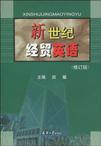新世纪经贸英语
2001-9-1
天津大学出版社
田耀
383页
无
为了进一步适应我国21世纪对外开放政策,使目前我国从事或即将从事外贸工作的人员加快提高自己的经贸及进出口业务素质,特别是英语水平,我们修订了《新世纪经贸英语》一书。本书以简单、准确的英语讲述了基础经济学、基础金融学和外贸进出口业务等方面的知识。本书难度适中,覆盖面广。 我们修订本书的目的主要是与时俱进,使读者能在一册书中同时系统地学习和掌握一套完整、全新的经贸知识,即基础经济学知识、基础金融学知识和外贸进出口业务知识,从而提高读者在经贸业务实践中正确运用经贸知识和使用标准英语的能力。 本书语言风趣,讲解简明易懂,读来流畅清晰。本书每课后均附有单词注释、概念注解、难句翻译和综合练习,有利于读者加深理解。 阅读本书既能提高英语阅读水平和语言表达能力,增长读者的经济学、金融学和外贸进出口业务知识,又能扩大专业词汇量,提高阅读高难度原版经贸著作的能力。 本书不仅适用于高等院校外贸英语专业的学生,也适用于参加外贸英语专业自学考试的高职学生和中专学生。对其他专业的读者也能起到很好的经贸知识入门指导作用。 由于时间仓促及编者水平有限,难免有疏漏和不妥之处,望广大同行和读者指正。
本书由基础经济学、基础金融学和进出口业务三部分组成。本书的每课都配有英汉注释、综合练习及全部练习答案。所用英语规范、生动,符合当今经贸英语的实际。读者在研读此书后既能学习经贸业务知识,又能学到现代流行的经贸英语。
1. What Is Economics2. To Satisfy Human Wants by Using Economic Resources3. Types of Economic Systems4. Adam Smith & John Maynard Keynes5. Opportunity Costs and Marginal Costs6. Sources of High Productivity7. Perfect Competition & Monopolistic Competition8. The Characteristics of Monopoly9. The Characteristics of Oligopoly10. The Concept of Aggregrate Supply and Aggregate Demand 11. The Consumption, Saving, Investment Relationship12. Employment and Unemployment13. What Is Full Employment14. The Nature of Inflation15. Demand-pull Inflation and Cost-push Inflation16. The Role of Govemment17. Sources of Government Revenues18. Money and Its Functions19. Balance of Payments20. Foreign Exchange and Foreign Exchange Rate21. Foreign Exchange Market22. Exchange Rate Determination23. The Intemational Monetary System24. The Money Market25. Tools of Monetary Policy26. The Structure of Financial Markets27. The International Monetary Fund28. Introduction to International Trade29. The Advantage of International Trade 30. European Economic Community31. Trade Tenns32. Barriers to International Trade33. Technology Transfer34. Business Internet35. Futures Trading36. Business Negotiation37. Contract38. Letter of Credit39. Bill of Exchange40. Bill of Lading41. Marine Insurance42. Lloyds43. Commodity Inspection44. Transportation45. Arbitration46. Advertising47. Multinational Corporations48. The World TradeOrganization49. Tenders50. What Is Marketing
Economics is basically the study of the decisions a society makes regard-ing the production of goods and services and the division of this among its peo-ple. As we shall see, different societies make these decisions in very differentways, but all societies are faced with the same problems —— how to use theireconomic resources to the best possible advantage. By economic resources we mean all natural, human, and manufacturedresources that go into the production of goods and services. That includes allthe factory and farm buildings and all the equipment, tools and machinery usedto produce manufactured goods and agricultural products; all tmnspotaion andcommunication facilities. labor is a very broad term that covers all different mental and physical ca-pabilities and skill possessed by human beings that can be used to producegoods and services. Labor is thus the largest single resource or input availableto any society. Labor is scarce relative to the desire for the output of goods andservices made with the help of labor. Labor consists of the services provided bydoctors, teachers, drivers, construction workers and so forth. Simply speak-iog, labor comprises the physical and mental skills and capabilities possessedby humans, which are used in the process of production. Capital is divided into two categories. One is financial capital that con-sists of "paper" assets or claims like bonds, stocks and savings accounts.

无